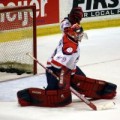Part 1
Interviewer: We've been joined by my son Mark because we are going to talk a bit about sports and hockey in particular and of course Mark played hockey throughout in his childhood and then in university went down to Yale in the states to play hockey and then played for team Canada and played professional in Europe and eventually in Japan. So, hockey gave him an opportunity to see different parts of the world.
So, today I would like to talk about hockey and also about sort of hockey development and how it relates to education. I think Cam has a particularly good background in that, but maybe I should ask Mark, what do you think, before we get to the details of hockey, if you look back what do you think was the greatest sort of reward, or what do you think you gained the most, from your involvement with hockey over the years. It is a difficult question. You may have to think about it.
Mark: For sure, that is a tough question. There were lots of different experiences that I had through hockey that I am thankful for. Number one, you mentioned that I went to Yale, that was a great experience and for sure, I would have never have gone there had I not been recruited by the hockey team. It was going to the school was a great experience and also the hockey part of it - US college hockey is lots of fun - the atmosphere - that whole side of it. I guess the opportunity to see the world, playing hockey, was a phenomenal opportunity both in Europe and in Japan. I guess with Team Canada I went to many different countries and then I played in Switzerland, Austria, Italy, and then, of course, Japan.
Interviewer: Now Canada has been a hotbed of hockey but there are more and more countries around the world are interested in hockey. I think, Cam, you have been involved both with the development side of hockey in Canada but also in other countries. Maybe you could tell us a little bit about some of your international experience in hockey and what you have done.
Cam: Interesting enough, not as a player as much, but as a coach, I was fortunate enough to go to China back in 1981, where I coached the National Chinese Team. What was interesting was they were in the World C Pool. When you think of hockey, you think of the big eight. When you look at the B Pool where there is another eight countries that were involved. Then you keep on sliding down to the C Division and you realizing there is an awful lot of countries that play hockey and are interested in competing at an international level.
So, when I was there I was given the task to coach China's national team. It was really quite interesting because the teams that we were playing against are really teams that you wouldn't think would be playing hockey, like Great Britain, for example, Romania, Yugoslavia, places like that - or North Korea. I kept thinking, "Wow! It's amazing!" So, consequently that first experience was really quite gratifying.
To carry on, a few years later, to take what I guess you would call a preparatory team over to Czechoslovakia, prior to the break up, was also quite interesting because we had time to spend there with their coaches of their under 17 and under 18 teams.
Interviewer: Sorry, this was with the Chinese team?
Cam: No, This was with our team in Canada, we called Team Pacific, which was made up of players from Alberta and British Columbia, and consequently, these kids had never experienced traveling abroad. It was a development team and to work in conjunction with their coaches in Czechoslovakia and also working with their players - understanding their systems of play, and things of that nature. Everybody walked away just that much more interested in the game and obviously what's more interesting probably is to create the friendships and the experiences. When Mark talks about going to Yale it's really interesting. I keep thinking that hockey, to me, was a series of moments, like life itself, in the sense that it's not the games that you think about when you win it's the people you meet?.

